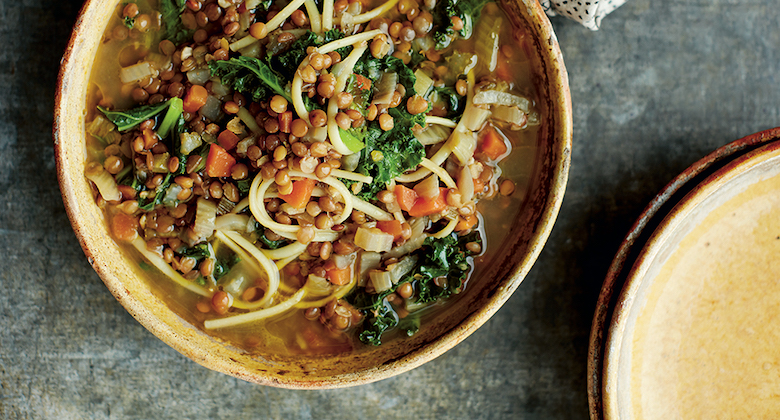
Yasmin Khan writes, in the introduction to her new cookbook Zaitoun: Recipes from the Palestinian Kitchen, that there is no country called Palestine—not officially. “It hasn’t existed since the British Mandate of Palestine ended in 1948,” she writes. “But the national and cultural identity of the people has never waned and neither have the delights of the cuisine.”
She doesn’t shy away from what has, since 1948, been an ongoing political struggle. “More than four million Palestinian refugees live in Jordan, Syria and Lebanon,” she writes, “making Palestinians the largest refugee population in the world.” Because of the Israeli blockade of Gaza, she could not visit the region, and so she experienced its culture through cooking in the homes of Gazans in the diaspora. In this book, the kitchen provides an essential site of resistance to erasure, because the land cannot.
It helps to remember that before Khan was a food writer, winning accolades for her first book, The Saffron Tales, she was a human rights campaigner. These two jobs are connected, as she sees it, and she enacts diplomacy when she notes that she kept Israeli voices out of this book to make space for Palestinians. The title, Zaitoun, means “olive” in Arabic; it’s an essential ingredient in Palestinian cooking, as well as an international sign of peace.

For many, a recipe might be as close as they can get to the region—to being among the “falafel vendors and fruit sellers, knafeh makers and khubz bakers.” Through Khan, readers learn that the cuisine of Palestine is focused on local, plant-based foods and is tied tightly to the seasons. There are also three main regional cuisines: the Galilee, the West Bank and the Gaza Strip. The latter cuisine’s signature includes bold use of dill, green chilies and garlic.
The recipes, helpfully indexed in the back by suggested meal menus and dietary restrictions, include all the hits: hummus, charred eggplant with tahini, khubz (flatbreads), labne three ways, tabbouleh, falafel, a ton of lamb—but also Khan’s vegetarian eggplant and feta kefte, a range of fish recipes and an apricot and rosewater rice pudding called roz bil halib. It’s a cookbook filled with fresh, doable recipes, made with accessible ingredients. The roast eggplant with spiced chickpeas and tomatoes, for example, requires only ingredients found at the neighborhood Key Food.
To get a taste of the dishes and hear Khan speak about her experiences in Palestine, head to the Museum of Food and Drink in Williamsburg on Wednesday, February 6, where Khan will be in conversation with Cherry Bombe editor-in-chief Kerry Diamond. The discussion will range from the importance of storytelling to cultural ownership of food to what kind of power travel writing can have under the current administration.

Kale, fennel and noodle soup (Rishta)
This simple, rustic soup is elegantly soothing. It bears a close resemblance to the classic Iranian noodle soup aash e reshteh, which leads me to believe that it found its way into the Palestinian kitchen during the time when the Persian Empire ruled over the region 2,500 years ago. Whatever its history, it is a soup I make whenever I want to replenish depleted energy levels, or when I want to offer something restorative at the table, as it is packed with greens and healthy legumes. Feel free to substitute the linguine for another pasta, just be sure to adapt the cooking times according to the packet instructions of your noodle.
Serves 4
INGREDIENTS
1 onion, finely chopped
2 tablespoons olive oil or any neutral oil
3 garlic cloves, crushed
1 carrot, finely chopped
1 celery stick, finely chopped
1 fennel bulb, finely chopped
½ teaspoon fennel seeds
½ teaspoon cumin seeds
½ teaspoon coriander seeds
½ teaspoon dried oregano
Freshly ground black pepper
¾ cup (approximately) or 140 grams brown lentils
3 cups or 750 milliliters vegetable or chicken stock
2 ounces or 75 grams linguine
½ teaspoon salt
5½ ounces or 160 grams kale, stalks removed, leaves torn
3 tablespoons extra-virgin olive oil
Juice of ½ lemon (optional)
DIRECTIONS
Fry the onion in the cooking oil for about 5 minutes over a medium heat. Add the garlic and fry for another few minutes before adding the chopped vegetables. Stir to coat the vegetables in the oil, then cover and leave them to sweat over a low heat for 10 minutes.
Meanwhile, toast the fennel, cumin and coriander seeds in a dry pan for 1 minute until their aromas are released, then grind them in a mortar and pestle or a spice grinder. Add these to the vegetables, along with the oregano and a generous grind of pepper.
Add the lentils and 1⅔ cups or 400 milliliters just-boiled water, then cover and simmer over a medium heat for 10 minutes. Pour in the stock and cook for another 15 minutes.
Break the strands of linguine into thirds, add them to the pot with ½ teaspoon salt and cook for 10 minutes. Finally, add the kale and cook for 5 minutes.
Stir through the extra-virgin olive oil, then taste and adjust the seasoning, adding a touch more salt and pepper or a squeeze of lemon juice, as you prefer.
Recipe from Zaitoun: Recipes from the Palestinian Kitchen by Yasmin Khan. Copyright © 2018 by Yasmin Khan. Reprinted with permission of W.W. Norton & Company, Inc. All rights reserved.



